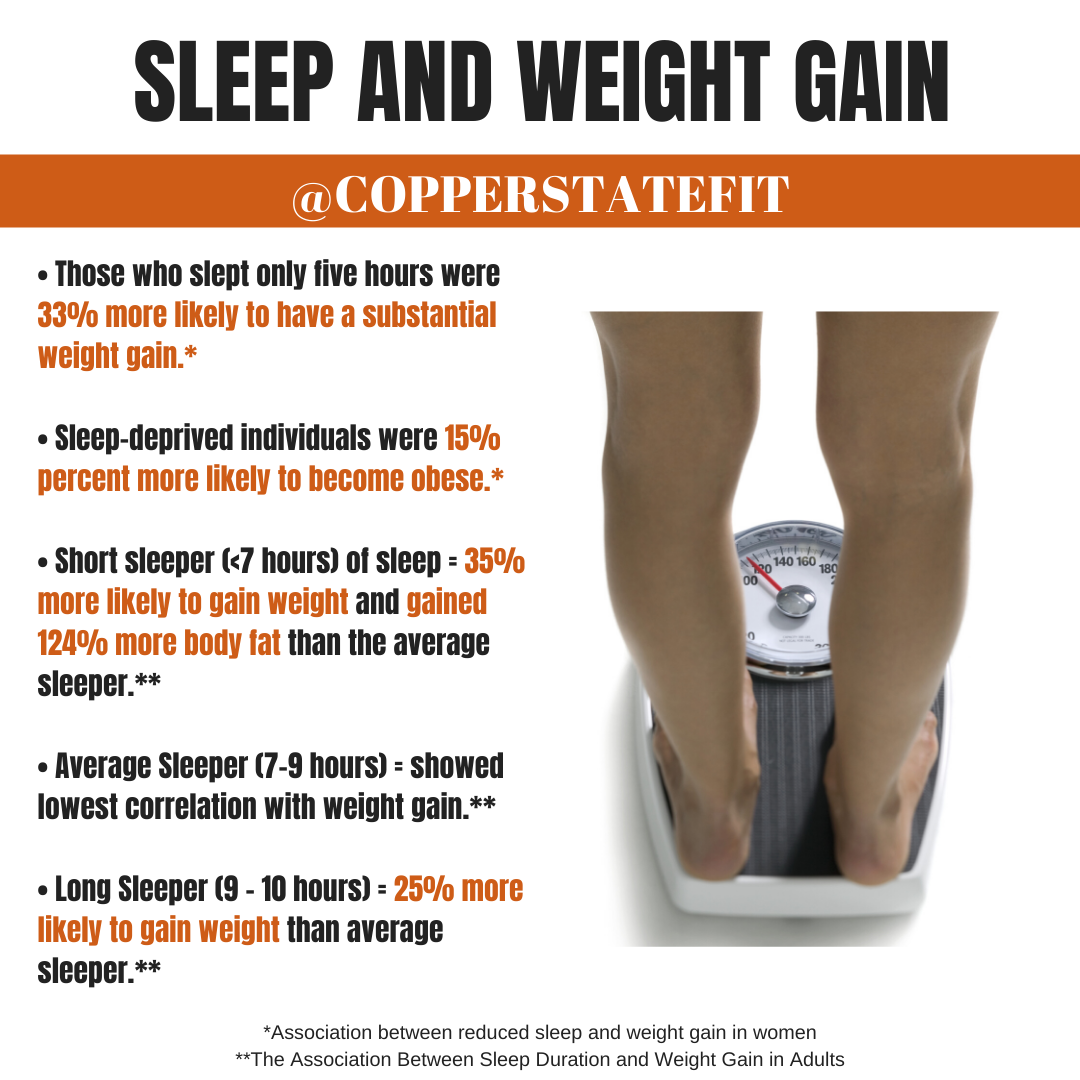According to research, sleep deprivation IS correlated with weight gain.
HERE’S HOW SLEEP DEPRIVATION CORRELATES TO WEIGHT GAIN:
- Sleep deprivation may alter hormones involved in appetite control and metabolism. In turn, people tend to eat more, move less and have impaired decision making.
Whatever the reason, what seems to be clear is that sleeping 7-8 hours each night could help prevent weight gain associated with sleep deprivation.
ONE STUDY ON SLEEP AND WEIGHT GAIN
In a study that followed more than 68,000 U.S. women for 16 years, researchers found that those who slept more each night tended to put on less weight during middle-age (1).
Here are some quick facts from the study:
- Those who slept only five hours were 33% more likely to have a substantial weight gain (33 pounds or more) during the 16-year study.
- Sleep-deprived participants were 15% percent more likely to become obese as they grew older.
A more recent study done over 6 years showed similar findings (2):
SECOND STUDY ON SLEEP AND WEIGHT GAIN
- Short sleeper (<7 hours) of sleep = 35% more likely to gain weight and gained 124% more body fat than the average sleeper.
- Average Sleeper (7-8 hours) = showed lowest correlation with weight gain
- Long Sleeper (9 – 10 hours) = 25% more likely to gain weight than average sleeper
Lack of sleep DOES seem to be one of many contributing factors to obesity. So, what can we do about it?
CSF’S TOP 5 TIPS TO IMPROVE YOUR SLEEP:
- Go to bed and wake up at the same time, all the time: It’s tempting to stay up late and sleep in on the weekends. However, if you’re struggling with sleep, we suggest keeping your routine the same. Allow your body to develop a consistent circadian rhythm. You may find after a few weeks, you naturally wake up without an alarm and you feel tired when it’s time for bed.
- Establish a relaxing setting at bedtime: Grab a book, listen to calming music, meditate. Whatever it takes to relax your mind.
- Digital Detox 60 min before bed: Turn off electronics – TV, cell phones, computers and dim the lights. Screens can emit blue rays which inhibit Melatonin production – an important hormone in regulating sleep.
- Avoid caffeine or any other stimulants within 8 hours of your bedtime – Though you may not feel it, caffeine has a half-life of 6-8 hours. So, if you’re slow to metabolize caffeine, that “afternoon pick-me-up” is actually your “night time keep-me-up”.
- Make your bedroom quiet, dark, and cool: We’re primed to sleep when it’s dark, quiet and cool. Cover up any lights, use black out curtains and turn down the thermostat.
All that said, it is important to be remember, correlation does not imply causation. The bottom line is; excess weight gain is caused by excess calorie intake.
Therefore, if you can influence the hormones that regulate your appetite (calories in) and improve your energy levels (calories out) by focusing on good sleep patterns, you will have a leg up in managing your weight!
REFERENCES:
- Association between reduced sleep and weight gain in women. Am J Epidemiol. 2006 Nov 15;164(10):947-54. Epub 2006 Aug 16. Patel SR1, Malhotra A, White DP, Gottlieb DJ, Hu FB.
- The Association Between Sleep Duration and Weight Gain in Adults: A 6-Year Prospective Study from the Quebec Family Study Jean-Philippe Chaput, MSc1 ; Jean-Pierre Després, PhD2 ; Claude Bouchard, PhD3 ; Angelo Tremblay, PhD1,4

